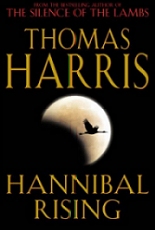

Hannibal Rising by Thomas Harris. William Heinemann, hb RRP: £17.99. ISBN: 0-434-01408-7
Hannibal Lecter is a character that needs no introduction. One of the most popular villains of all time, in literature and on film – thanks to an Oscar-winning performance from Anthony Hopkins in The Silence of the Lambs – until now we had only hints of what turned him into the monster (albeit an attractive and cultured monster) that he is. What exactly drove him to cannibalism, where did he learn to practise medicine, and who put the notion of the memory palace – first introduced in the book Hannibal, but left out of the movie – into his head. With Hannibal Rising his creator Thomas Harris finally answers these questions and more. But they certainly won’t be the answers you’ll be expecting…
The book begins by reintroducing the memory palace to readers in a prologue, urging us, in second person prose as a friend might, to open the doors to Lecter’s most secret rooms. To go back in time ‘as the beast turned from the teat into the real world’. In fact first we go back several centuries to when Castle Lecter was built using the slave labour of soldiers captured at the Battle of Zagris at the behest of Hannibal the Grim. Fast forward to our Hannibal, eight years old and the 8 th person to be given that name. The son of a Baron and his cultured wife, Hannibal’s only sibling is his younger sister Mischa whom he is incredibly close to. Up until now the Second World War hasn’t really affected their existence at the castle, but when the Nazis invade Russia as part of Operation Barbarossa, the Lecters find themselves having to hide away not only from enemy troops but their kinsmen turned traitors. Holing up in their hunting lodge, they’re eventually found by a group of such traitors and Hannibal is forced to witness the death of his family – though the exact details of what happened to Mischa he blots out. Picked up by a Russian tank after the Eastern Front collapses, the young boy is so traumatised he cannot even speak.
Forced to attend an orphanage school based in his old home at the castle, when he gives the bullies a run for their money in the viciousness stakes, he is finally collected by his uncle Robert and taken back to France with him. There Robert is a diplomat and artist, married to a beautiful Japanese woman named Lady Murasaki. Here he learns even more about the arts and about the Japanese code of honour. So when a local butcher makes indecent remarks about Murasaki in the market, Hannibal takes it upon himself to deal with the culprit, in his own inimitable fashion. Drawing the unwelcome attentions of Inspector Popil, who keeps an eye on the youth even after his uncle’s death and their move to Paris, Hannibal begins to piece together what happened to his sister and devotes himself to tracking down her murderers – whilst at the same time attending medical school and carving up cadavers. His only weakness? The fact that he has fallen in love with Murasaki and the people he is hunting are already hunting him…
As with Silence of the Lambs and Hannibal, Harris achieves quite a remarkable feat again – he creates a situation where we actually feel sorry for and ally ourselves with his most gruesome character. And he does this quite simply by making the characters Hannibal is up against more detestable than he is. When he escapes in Silence and says at the end, “I’m having an old friend for dinner,” is there really anyone who feels sorry for the callous Dr Chilton? The same with Mason Verger in Hannibal, who may well have been left in a state by Hannibal initially, but has been driven mad by his desire for vengeance. In the prequel we have a group of merciless black market dealers who aided the Nazis in the war, led by the heinous Grutas. When the young Hannibal goes up against them, there’s no doubt whatsoever who we’re rooting for.
Yet Harris also never misses an opportunity to show us that Hannibal, no matter how appealing a character, is also fundamentally evil himself. Able to fool a lie detector test as if he weren’t human, coldly severing heads and trapping one enemy inside a tank full of dead bodies until the air runs out: yes, there are reasons for his actions, but they are still shocking nonetheless. The most poignant scenes of all, I found, were the ones when we see Hannibal as just an ordinary eight year old playing with his sister or stroking horses. It begs the question what he would have turned out like if he hadn’t witnessed such atrocities at such an early age. Harris wisely leaves this for you to ponder yourself, without hinting either way.
This is essential reading for anyone – genre fans or no – as it’s a pitch perfect lesson in character creation. At time of writing the film is almost upon us, and I for one can’t wait to see it now.
© Paul Kane